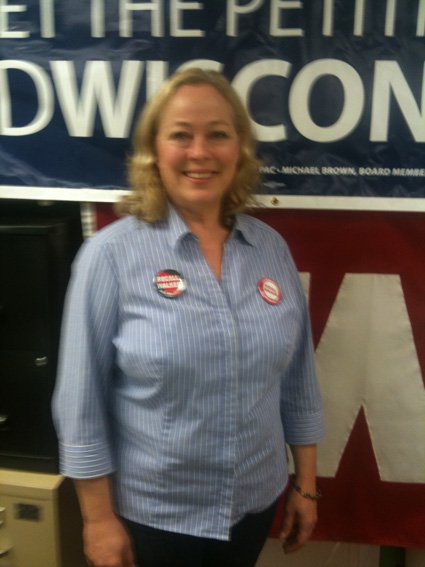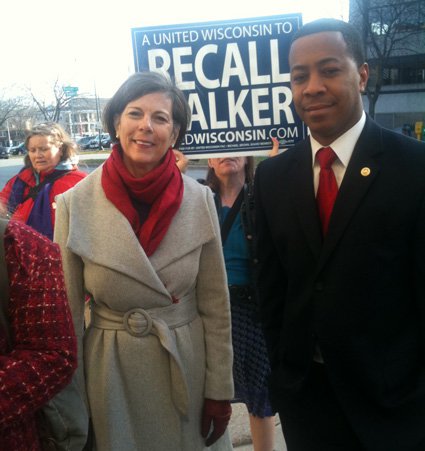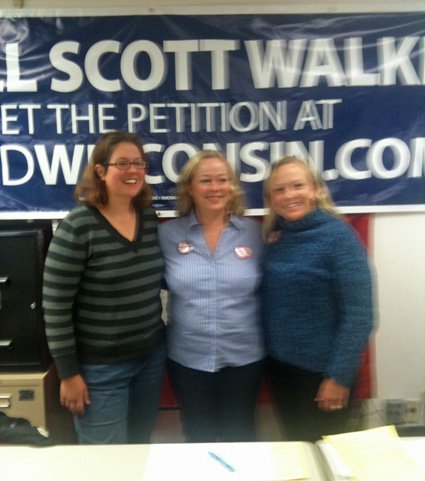Wisconsinites who couldn't wait to do their part to recall Governor Scott Walker started signing petitions at one minute past midnight on November 15.
On Monday night, November 14, hundreds of people crowded into Hawk's Bar and Grill on State Street in Madison to sign recall petitions at 12:01 and celebrate the kick-off of the 60-day signature drive to trigger Wisconsin's first-ever recall election for a governor.
On Tuesday morning at 9:00, Fort Atkinson forklift operator Julie Wells held a press conference at the Recall Walker office at 330 East Wilson Street in Madison, before marching a few blocks to the Government Accountability Board to file the papers that officially started the recall. (A prior, electronic filing made the midnight signatures valid.)
Wells, who is neither a registered Democrat nor a union member, stepped into the spotlight as the face of citizens who are trying to recall the governor after getting caught up in the Wisconsin uprising last spring.
Wells and ordinary Wisconsinites like her--not "big labor" or the Democratic Party--are the driving force behind the recall effort in Wisconsin.
At the recall office on Monroe Street in Madison, Mike Butler, a City of Madison Engineering Department employee with local 236 of the laborers' union, stopped in to pick up a petition for people on his 40-person crew, which drives snowplows and the big green trucks that clear sanitation lines.
"Just make sure you sign when you are off the clock," a Wisconsin United volunteer told him.
"Thank you!" he said.
"Unfortunately, the governor has taken $5,000 away from every employee in our union," Butler said. "And we don't make that much to begin with."
Two potential Democratic candidates for governor, former Dane County executive Kathleen Falk and Wisconsin Firefighters Association president Mahlon Mitchell, appeared with Wells at the Recall Walker headquarters, spoke briefly in front of the cameras, and marched to the GAB. But there is no clear candidate running against Walker yet. Nor is the date for the recall election set. It depends how long it takes for the GAB to validate signatures, and could be delayed further by legal challenges.
Meanwhile, citizen volunteers are driving the effort.
Neighborhood groups are dividing up their areas block by block to take petitions door to door. People like Eva Shiffrin of Madison's East High/Eken Park neighborhood are doing "drive-through" petitioning during rush hour on busy thoroughfares. Volunteers are targeting U.W. sporting events, including two women's basketball games on November 18 and November 30, as well as rallies, shopping malls, and outdoor festivals.
On November 19, there will be a massive recall rally around the Capitol in Madison.
Wells first got involved in the recall effort when she came to one of the historic protest rallies at the Capitol last spring. She signed a recall pledge circulated by Wisconsin United, the PAC that formed to recall Governor Walker and Lieutenant Governor Rebecca Kleefisch, and offered to volunteer for the organization.
"When Walker introduced that budget repair bill, and then the Democrats left the state, I went, 'Holy cow, what's going on? I've got to get there!" Wells told me after making her filing.
By late summer she had become Wisconsin United's county coordinator for conservative Jefferson County.
"We've organized the county. I don't think we even sleep anymore," Wells said. "We all have full-time jobs, but I think we spend more time on this."
Together with her friends and co-coordinators Sarah Hammer, a nurse from Fort Atkinson, and Erin Sievert, a closing officer at a title company, Wells calls herself part of "team awesome sauce."
Although none of the three women is in a union, they were upset by Walker's move to take away public employees' collective bargaining rights, by his tax breaks for corporations, and by education cuts, which Wells is afraid will adversely affect her twelve grandchildren, and by the stripping away of decades-old environmental protections in Wisconsin.
"As a nurse, what am I supposed to tell the children who won't have health care anymore without Badger Care?" Hammer asked.
"I could talk for hours on what Walker is doing," added Wells. "Some of the damage he's doing can't be put back . . . he has to be stopped."
The response to their organizing efforts in Fort Atkinson, Wells says, has been "absolutely incredible."
When they held their first training session for people interested in circulating recall petitions, she got thirty RSVPs--and 120 people showed up.
"People are seriously fired up," Wells says. "And this is Jefferson County. If I were Walker, I would be worried.”
If you liked this article by Ruth Conniff, the political editor of The Progressive, check out her story "Way to Go Ohio!"
Follow Ruth Conniff @rconniff on Twitter



